Earned Wage Access & the American Overdraft Fee Crisis
/You know we have a serious economic justice problem in this country when the poorest Americans are paying $8 billion in overdraft fees in $35 increments to the nation’s largest banks. But that’s exactly what happened in 2020 and as the CFPB found in their recent work on this issue, as a result of the COVID-19 pandemic, that staggering amount of money was actually a decrease from 2019. Unfortunately, the decrease in Americans paying these overdraft fees is not the trend and overdraft fees are predicted to hit their highest levels ever in 2021.
Despite the best efforts of consumer protection advocates and similarly aligned elected officials, overdraft fees charged in the United States have steadily risen since the FDIC began collecting this data in 2015 from banks that have more than $1 billion in assets. Last year, 2020, was the only exception when banks reported a 24% decrease in revenue from these fees after consumers curbed spending, public assistance reached record highs, and some fees were waived because of the pandemic. The total revenue banks earned from overdraft fees according to the Center for Responsible Lending is especially troubling since approximately 95% of that total is collected from financially vulnerable people each year.

